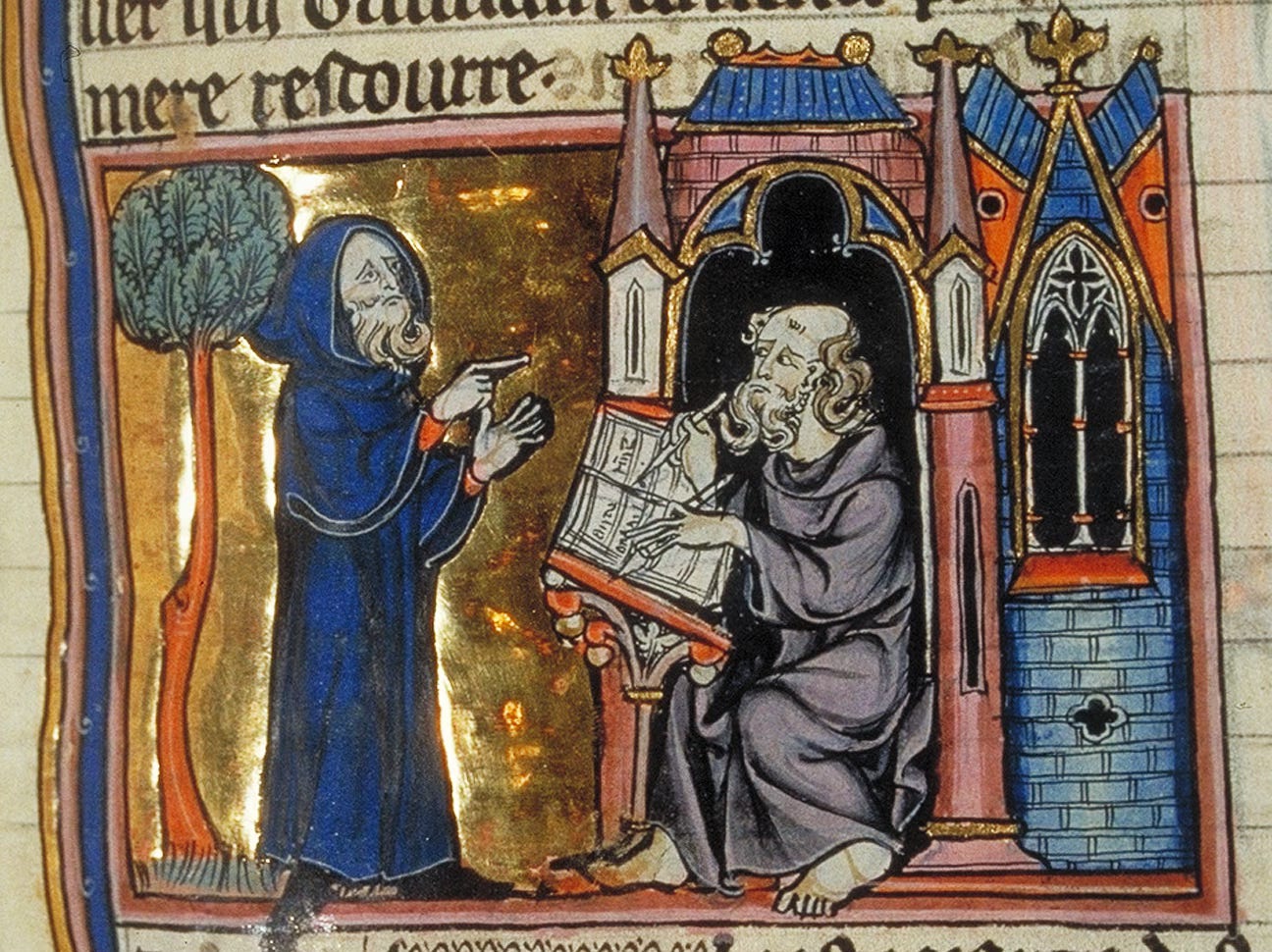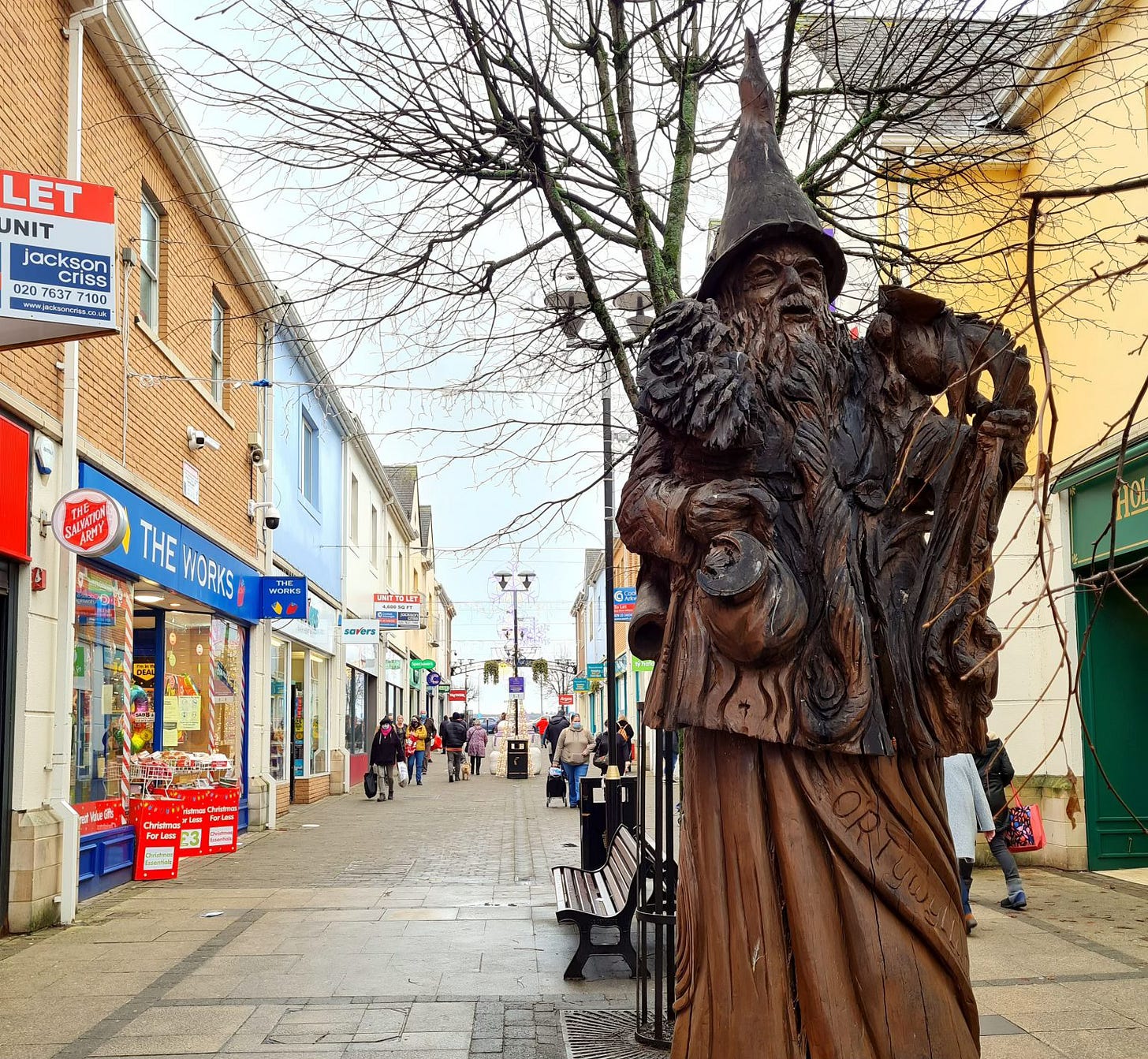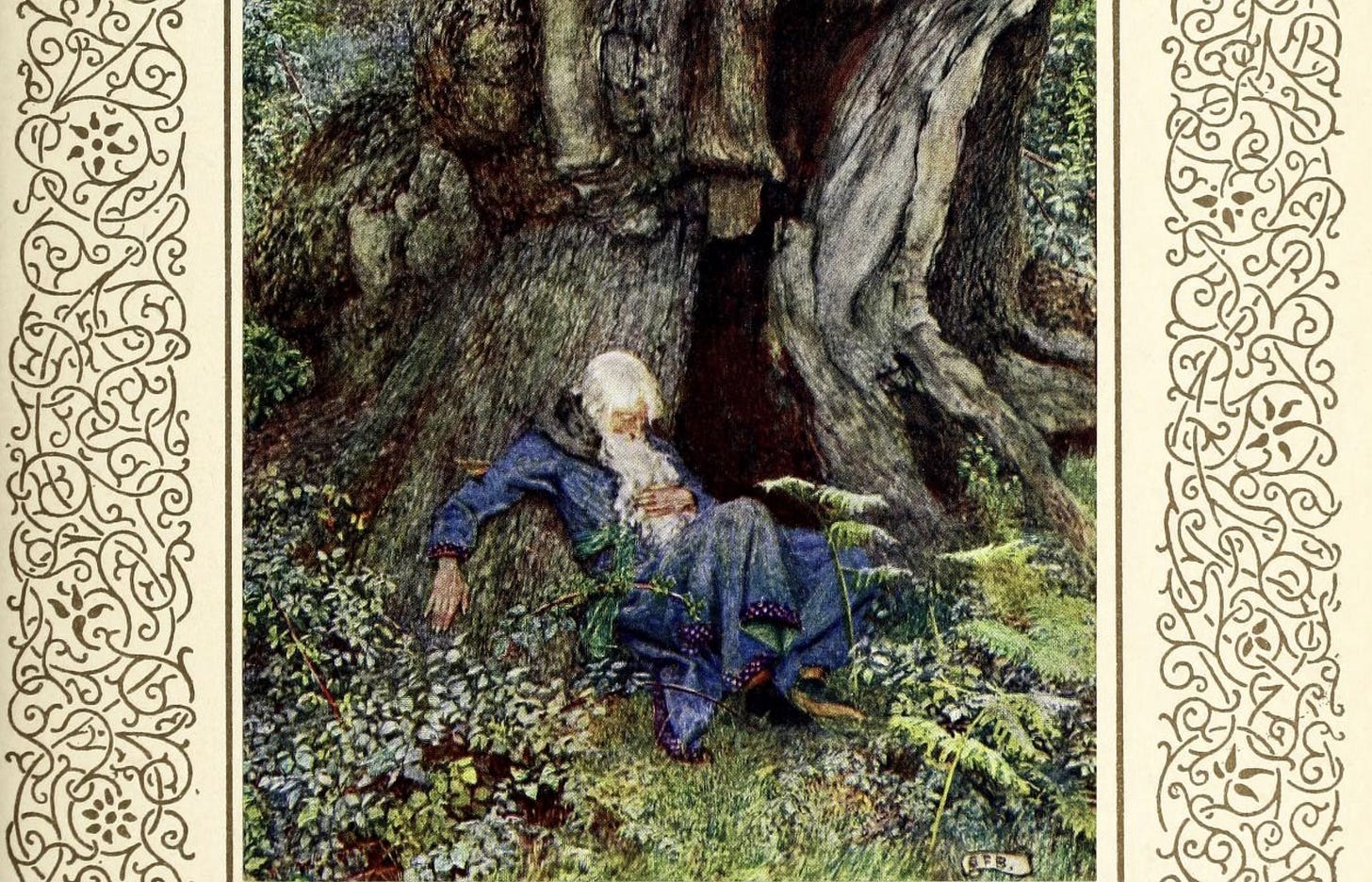The popular image of a wizard as an old man, with a long beard and a staff, has its origin in Merlin. Merlin was made famous by the twelfth-century writer Geoffrey of Monmouth, and according to Geoffrey, Merlin came from Carmarthen in Wales. Geoffrey’s association of Merlin with Carmarthen has led a quite speculative theory to emerge about the origin of Merlin that is still popular with people who write books on him. But does it have any historical justification?
In Geoffrey of Monmouth’s account, Merlin first appears after he was summoned by the ancient British king Vortigern. A fortress that Vortigern was building near Mount Snowdon kept collapsing and Vortigern’s wizards recommended that the king seek out Merlin in order to sprinkle the foundations with his blood. But Merlin recommended that Vortigern’s men dig under the fortress where they discovered a pool. Hidden in the pool were a white and red dragon who, when disturbed, started fighting each other. Merlin explained that the dragons symbolised the Saxons and British, and that while the Saxons were currently winning, a “boar from Cornwall” would soon emerge who would turn the tide. Merlin is also responsible, Geoffrey recounted, for changing the likeness of Arthur’s father Uther Pendragon into that of the Duke of Cornwall so that Uther could sleep with the Lady Igraine, Arthur’s mother.
Yet there is a longer history to Merlin than the tales of Geoffrey of Monmouth. Merlin appears in medieval Welsh poetry under the name Myrddin and it has long been conjectured that he was invented through the use of folk etymology. The name of Carmarthen in medieval Welsh sounds a lot like it means ‘Myrddin’s town’ and the marthen part of Carmarthen reflects the Roman place-name Moridunum ‘sea-fort’. But is this really where the name Myrddin came from?
The problem with this theory is explaining where the name Merlin came from. It is often claimed that Geoffrey changed the name Myrddin to Merlin because the Welsh form of his name sounds a bit like the French term merde ‘shit’.
But two places from France are recorded in medieval charters that feature the name Merlin: Merlincampus ‘Merlin’s field’ and Merlini Mons ‘Merlin’s hill’. They are both recorded a century before Geoffrey of Monmouth’s time and clearly continue a Roman name Merulinus. Merulinus literally means ‘little blackbird’ in Latin and it could well be that the Welsh name Myrddin derives from Merlin, not the other way around.
So how would someone decide? The idea that Geoffrey of Monmouth changed Myrddin to Merlin is just a guess, although it has been a very popular one. How would a linguist approach the problem?
Linguists argue mainly through parallels, not guesses. If there are parallels to the Welsh spelling Myrddin deriving from Merlin (or vice versa), then linguists would usually accept the derivation. But what kind of parallels would you look for?
Etymologically, the name Myrddin looks a lot like it means ‘madman’ in Welsh. In Welsh poetry, Myrddin recounts that he went mad at the Battle of Arfderydd, recorded as occurring in 573 in the Welsh annals. Arfderydd appears to be Arthuret in Cumbria, and after the battle, Myrddin is supposed to have wandered off into the Forest of Celidon where he developed prophetic powers.
Not much is clear, however, about the Battle of Arfderydd. Welsh tradition seems to indicate that it was fought between armies led by Gwenddolleu of Arthuret and the brothers Gwrgi and Peredur of York. But some accounts make Gwenddolleu’s opponent Rhydderch the Old, a king of Al Clut in Scotland.
Geoffrey of Monmouth retold the story in his poem Vita Merlini (The Life of Merlin), but he made Merlin a slightly different person to what is recorded in the Welsh Myrddin poems. There is also a medieval Scottish tradition in which Merlin is called Lailocen, although it remains unclear how the different traditions should be reconciled with each other.
Yet there is an obvious reason why the name Merlin would have been changed to Myrddin in Welsh. It is because Merlin was associated with being mad. Merlin the madman could easily have become Myrddin in this manner. All that would be needed is for a Welsh poet to change Latin -lin to Welsh -ddin ‘man’.
The key question, however, is are there any parallels for this? The answer is resoundingly yes. It was quite common for Latin names to be changed slightly when they were adopted into Welsh.
The Roman name Honoratus is a good example. It turns up in Welsh as Anaraud. The loss of the H- is not surprising because it was a silent letter in Latin. But Welsh ana- where the Latin name has Hono- seems to reflect what is known as nativisation. Welsh did not have any words beginning with ono-, but names beginning with ana- are fairly common in the Celtic languages.
The pattern is even clearer with the saint’s name Eleutherius. It is recorded in an early Welsh genealogy as the name of Eleuther Cascordmaur, although he is later called Elifer Cascordmaur. The change from Eleuther to Elifer is not a regular linguistic development, but the byname Cascordmaur means ‘of the great war-band’ and another way of referring to a warband in medieval Welsh is eliflu or elyflu ‘great host’. Eleuther ‘of the great war-band’ seems to have been changed to Elifer on the model of eliflu ‘great host’.
According to the Welsh Myrddin poems, Merlin was a madman and the change of his name from Merlin to Myrddin makes linguistic sense. The name Merlin was a foreign form in Welsh, so it was changed to Myrddin because mer- means ‘mad’ in the Celtic languages and -ddyn means ‘man’.
So was Merlin really someone who went mad at the Battle of Arfderydd? A soldier going mad in battle makes a lot of sense as the negative psychological effects of warfare are widely recognised today. Roman names were also more common in the sixth century than they were in later times, so Merlin being a sixth-century figure makes considerable sense. But there is not enough historical evidence to clearly link Merlin with the Battle of Arfderydd – it just remains a tradition, not verifiable history.







Is there any etymological connection between Odin and Merlin?
Seems like a weird question but the connection to 'madness' you mention piqued my interest. I know Odin is derived from roots meaning "mad inspiration". Merlin also possesses other contextual connections to Odin:
- Odin places a sword in a tree as a test in the Saga of the Volsungs (Merlin in a stone).
- Odin is a God associated with Kings and providing instruction to Kings - Merlin's primary role is as a counselor to King Arthur.
- Merlin possesses prophetic wisdom - Odin is a seeker of prophetic knowledge.
- Odin is also known to disguise himself.
- Modern depictions of Merlin mirror Odin's typical garb less the missing eye (pointy hat, robes, beard)
Not trying to say they're the exact same - just curious if there is any etymological evidence attaching Merlin to Odin.
'But two places from France are recorded in medieval charters that feature the name Merlin: Merlincampus ‘Merlin’s field’ and Merlini Mons ‘Merlin’s hill’.
Years ago I was dating a girl from Rennes in Brittany, one day she took me for a drive and we ended up in some woods where she proceeded to show me a fenced off Stone (if i remember rightly) with a plaque stating Merlins burial place!